“When you want to find even dog poop to use as medicine, there isn’t any.” -Korean proverb
Note: RTE’s National Pandemic Case Studies can now be found here at the Campfire.wiki.
South Korea may be currently one of the more interesting case studies in pandemic governance given its recent troubling scandal over the cult ties of ousted President Park Geun-hye. President Park was revealed to have ties with Choi Soon-sil, the daughter of Choi Tae-min, who led the Church of Eternal Life, a South Korean cult. Within this cult was the Yongsae-gyo, or “Church of the Spirit World” where Choi was seen as a Buddha-to-be. Choi Soon-sil was revealed to use influence over President Park to extort money from major corporations and educational institutions, and to have access to classified materials.
Disturbingly, Choi’s influence over South Korean politics coincided with the emergence of K-Pop.
The South Korean musical style became popular worldwide, but was engineered by South Korean intelligence as a controlled cultural export. Much like seemingly everything that appears on the child-centric network Nickelodeon, which jumped on the K-Pop bandwagon early, K-Pop was quickly revealed to be littered with sex scandals. You can read about them at NPR. But don’t expect NPR to cover the pedophilia angle (here, here, and here).

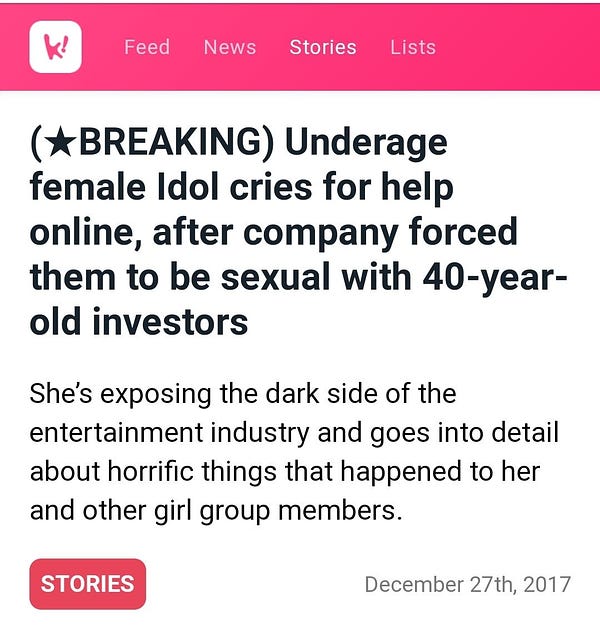
Choi befriended and groomed Park Geun-hye in the 1970s (just after her mother was assassinated) by feeding her a story about the eventual South Korean President’s mother coming to him in a dream, asking for him to watch over her. Park Geun-hye was also the daughter of South Korean general, politician, and oligarchy-organizing leader Park Chung-hee, who was himself assassinated in 1979 by a close friend working with the KCIA, South Korea’s powerful intelligence organization.
What do cults and sex scandals have to do with pandemic policy?
Either you understand by now that most pandemic policy was health security theater or worse, or I don’t have time to explain it all to you in this article. An environment of political corruption is a single point of failure that can turn governments into organized agents of mass murder, whether in conflict with rival nations, or among their own people.
South Korea’s Complicated Tale of Early Treatment Medicines
The first detected case of the novel coronavirus in South Korea came on January 20, 2020. From there, a few cases began spiraling at an exponential rate. South Korean health officials recommended hydroxychloroquine (HCQ) to treat patients on February 13, even before Chinese officials announced their own treatment plans. By late February, case reports peaked at nearly a thousand per day. From that point, South Korea saw rapid attenuation of the outbreak without any significant lockdowns beyond regulation of large gatherings. For the most part, shopping malls, restaurants, and factories remained open. Fatalities peaked on March 24, twelve days after formalizing the HCQ standard treatment protocol as a national recommendation. From that point, cases declined quickly and steadily.
On June 3, 2020, South Korea granted emergency approval for remdesivir’s use in treating COVID-19. Eighteen days later, South Korean medical officials also reversed their recommendation to use HCQ to treat COVID-19 patients.
On August 1, in the midst of South Korea’s battle to contain COVID-19, the nation arrested an alleged cult leader (different cult) whose members were said to comprise 36% of all infected patients in the country. However, COVID-19 cases and deaths grew from that point for the remainder of 2020, though still remaining mild relative to international totals.
South Korea’s Mass Experimental COVID-19 Vaccine Campaign
South Korea began its experimental mass injection campaign on February 26, 2021.
South Korea has deployed five different quasi-vaccines to fight what was a relatively small public health threat in 2020. Four of those have been deployed as of early 2022 with the AstraZeneca and Pfizer-BioNTech products comprising over 90% of doses delivered as of March 20, 2022. A total of 700,000 expiring doses of the Pfizer vaccine were borrowed from Israel.
South Korea’s vaccination program trailed the global average until late August when dose administration ramped up dramatically. South Korea is now among the most vaccinated nations in the world at 87% fully vaccinated and over 60% boosted.
In the wake of all that, South Korea is currently suffering its first large COVID-19 outbreak, and one of the worst that has been seen anywhere in the world.
Lately, South Korea seems to be in the news daily as it breaks records for daily cases or deaths. And its public health response—once touted as a worldwide model—looks more like a clown car in neutral on a steep hill. Or, as The New York Times calls it, “unsustainable”:
From that article,
But as the fast-spreading Omicron variant threatens to overwhelm the public health system, that strategy now appears unsustainable — and it may even be pointless, South Korean officials say. Now, they are shifting the country’s pandemic focus to a new game plan: “select and focus.”
In the past week, South Korea has begun asking patients who test positive to simply look after themselves at home, while the country redirects resources to those who are most vulnerable. This new approach has unsettled people who have grown used to the government’s heavy-handed virus intervention, and as the number of people fending for themselves at home has surged, so have the complaints.
Some say they were not put through when they called pandemic hotlines seeking information.
Being left alone has felt like “home abandonment” to many.
Medical supplies the government promised to deliver — such as thermometers, oximeters, hand sanitizer and other pandemic necessities — have failed to arrive on time.
The article never mentioned HCQ, or other early treatment options, a single time. But it does self-reference the NYT’s March 23, 2020 article about South Korea’s amazing high tech contact tracing system that made Koreans virus-free stealth ninjas [you stupid Westerner]. That article also suggested that during emergencies, “like pandemics, privacy must be weighed against other considerations, like saving lives.” No word from the NYT as to whether early treatment should weigh in first.
South Korean biopharmaceutical company Korus Pham inked a deal to produce 500 million doses of Russia’s Sputnik V vaccine, though none of those doses are intended for domestic consumption, oddly. The cost per dose will be around $10, putting it in reach of most school children, for whatever that’s worth.

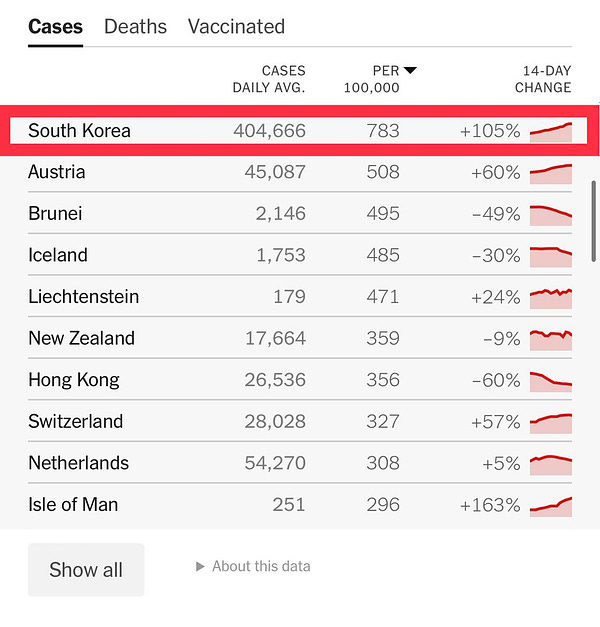
It’s a dark day when the mask ninjas fail—almost as if they were ordinary human beings unable to keep gnats from passing through chain link fences. Or maybe the quasi-vaccines have an unexpected effect of neutralizing masks, and contact-tracing never was that great to begin with. It’s hard to say under the confusing fog of plandemonium.





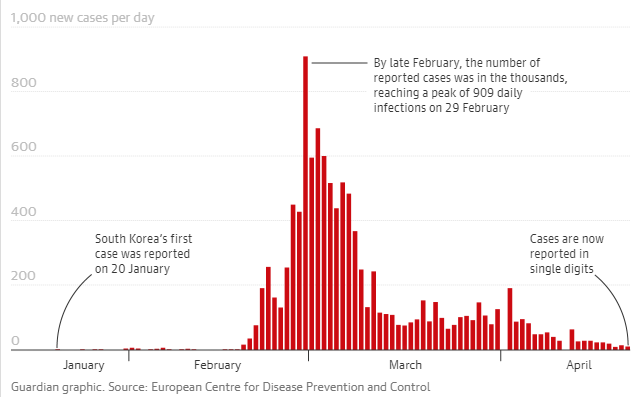
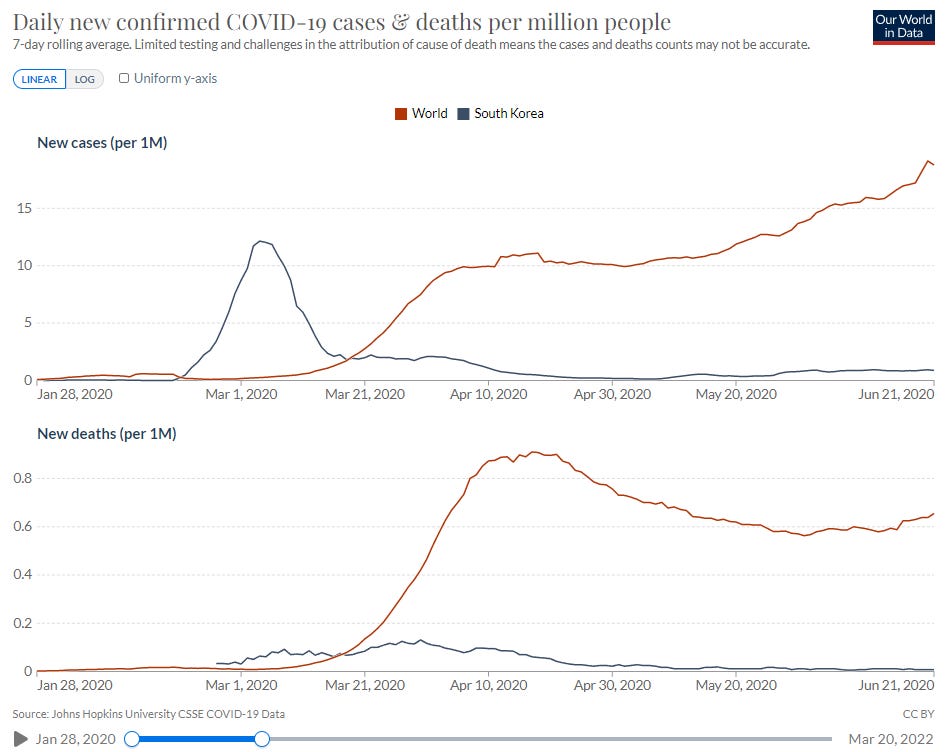

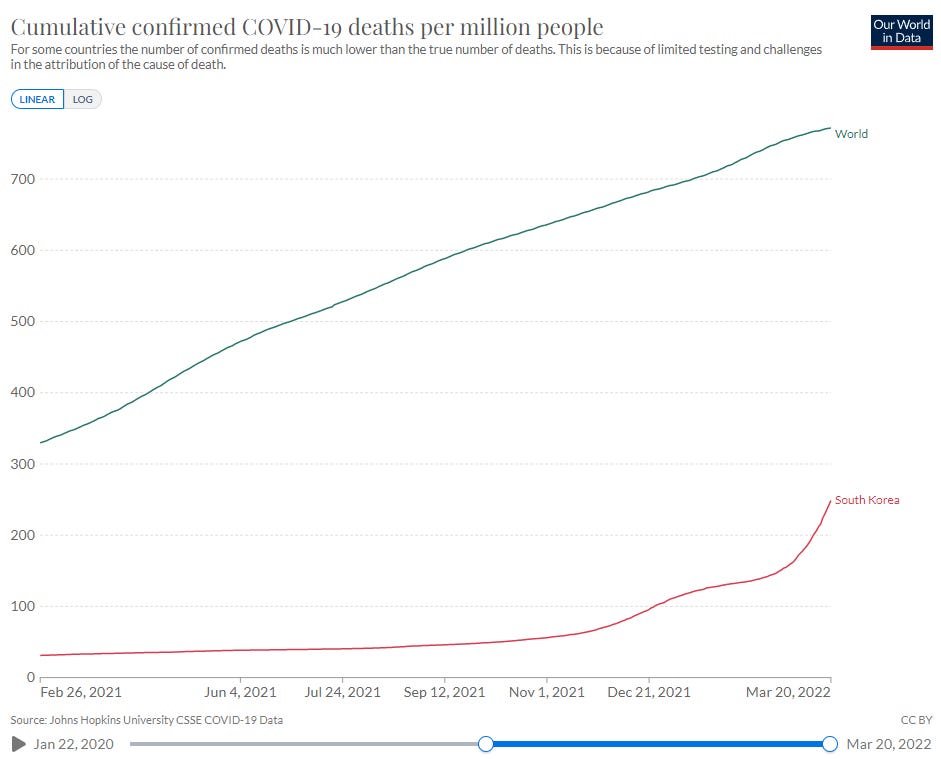

Speaking about scandal from this ousted SK president, one of the biggest castrophes in recent history happened under her, when a sinking ship killed hundreds of people, most of the high school students. Most people who survived were students who didn't listen to the crew members. The crew members left the passengers in the cabin and left before the ship sank.
Who is responsible for the halt in early treatment ? South Korea will start jabbing 5-11 end of this month.